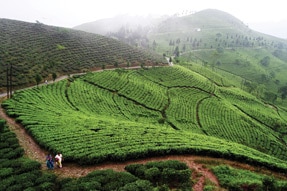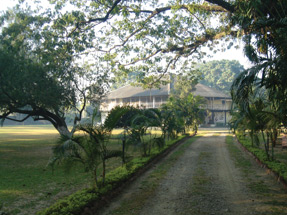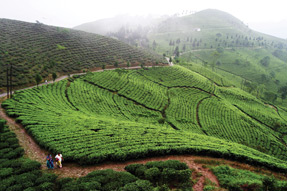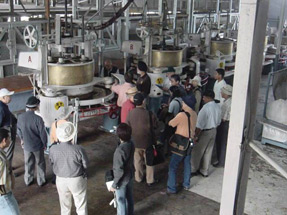Arts
All For A Cuppa!

The silky sunrays kiss your forehead, the cool breeze caresses your hair and the fragrant air infuses your spirit with prana (life force). Step out of your room, holding your bespoke hot cuppa and sit in the veranda of this old colonial building set amidst lush tea estates. Watch tea-pickers pluck the newest leaves and toss them into the wicker baskets on their backs or witness the soft drops of the hill rain turn the landscape into a misty wonderland. Enjoy a fascinating tea tour and indulge in flavorful tea tasting sessions. What’s more, with the world’s best range of teas in these 500-plus plantations, have your tea custom-made. And how about planting your own tea bush to mark your visit?
Following in the footsteps of the wine regions of Europe and the coffee plantations of Central America, India’s tea estates, the largest exporter of tea in the world (collectively producing 981 million kilograms in 2009), are promising tasteful retreats for tea-connoisseurs from around the world. These refurbished tea gardens offer exciting package tours to Assam, Darjeeling in West Bengal, Munnar in Kerala, Palampur in Himachal Pradesh and Ooty in Tamil Nadu. The growing recognition of tea’s medicinal value as an anti-oxidant, which might reduce the risk of cancers, and caffeine-free herbal varieties, has tourists from around the globe beating a path to India’s colonial past. The exotic tea tours showcase the process through which the humble leaf is transformed into the much-sought after brew. It’s fascinating to see colorfully-dressed tea pluckers, predominantly women, plucking the delicate leaves and a bud adroitly with their lissom fingers. The tea tasting sessions in the tea gardens of India allow tea lovers to discover the differences in aroma, flavor and appearance of tea manufactured using different techniques, and during different times of the year. Often the sessions also include tasting teas from other parts of India and the world, together with examples of flavored and blended teas. Darjeeling
The journey from New Jalpaiguri to Darjeeling offers breathtaking views of undulated terrains. The unique flavor and aroma of Darjeeling tea gives it its reputation as the “champagne of teas.” Nestled in the foothills of Himalayas, Darjeeling has tea estates at elevations of 1,000-2,000 meters above sea level. With the Kanchenjunga Peak as its shelter, Darjeeling’s tea estates sprawl across several towns (including its namesake) in a mountainous corner of India cradling the border with Nepal and Bhutan, as well as Tibet not far to the north. “Besides being the first garden to be certified for trade in the world, we were also the first to market Darjeeling Greens, Oolongs and Silver Tips,” says Rajah Banerjee, the fourth generation owner of this 1859 tea estate. “We grow vegetables in our biodynamic garden of the Stone House. And hence, our meals are all organic.” The enchanting forest cover of this estate has made it home to many endangered species, including panthers, tigers, birds, butterflies, snakes, spiders, etc.
Bereft of any local transport, walking miles on the beautiful ravines is a part of life in Darjeeling. The air here spells old world charm. “For hiking enthusiasts and bird watchers, Glenburn Tea Estate offers a haven amidst its sprawling tea gardens,” says Spanish nature lover Nhora Tori. Indeed. Offering a breathtaking view of the Kanchenjunga Mountain Range, the Burra Bunglow — a 150-year-old plantation house at Glenburn — offers different suites, each designed on a different theme. Nearly 80 percent of the clientele at the bungalow are international tourists. The lodge boasts of multi-cuisine dining , as well as yoga, massage and spa packages. Then there is Kurseong, a fine boutique hotel where the theme is tea and trains, and the Cochrane Place. The door to this cafe is shaped like an engine. The mesmeric place offers a jacuzzi spurts tea bath, tea facials, and tea-based dinner. Assam Further east from Darjeeling, one gets to bite some flowery, spicy and malty flavors of tea. One of the major tea producers in the world, Assam is home to numerous tea estates spread across 216,200 hectares of land that produce more than 360 million kg of tea annually.
Here’s an itinerary for an enlivening tour: Visit a tea plantation in Assam, pluck your own tea leaves and see it being processed the next morning; live in colonial grandeur; explore local villages and sights; spend a day out on one of the numerous islands on Brahmaputra River, the second longest river in the world; experience how different varieties of tea are processed in surrounding plantations; enjoy a local dance performance; ride an elephant and discover wildlife in Kaziranga National Park, and visit an auction center. Or maybe just lounge in the verandah at your lodge, sipping tea and reading a book. A brief sojourn in one of these tea plantations is a charming experience that offers a subtle ambience — a sensory calmness — rarely to be experienced in busy cities. Assam is also the birthplace of Indian tea, a story that dates back to 1823 when an enterprising Englishman named Robert Bruce discovered the tea plant growing wild in the state and exported the first 8 chests of Indian tea to a London auction in 1839. “One who has experienced it knows how exciting it is to learn to pluck two leaves and a bud and then get exposed to withering, machine and hand rolling, fermentation/oxidation, drying, sorting and packing, not to mention the numerous cupping and tastings in a tea factory. The best idea is to let visitors experience first-hand the secrets of ‘terroir’ — that spiritual connection between soil, climate, plant genes and human activity that defines our ‘vintage’,” says Anand Chatterjee, president of a fourth generation owned tea company, Signature Estates.
Over the years, Assam has become a much sought after tea tourism destination. It is famous for its Tea Festival, which is celebrated every year in November. “It’s nice to see a spurt in the number of international tourists in Wild Mahseer Lodge,” says Durgadas Sarcar, manager. Wild Mahseer is especially known for its sumptuous multi-cuisine specialities, palatial rooms, picturesque locale and global tea tasting sessions. The lodge is well-equipped for fast and still water fishing. Intertwined with local culture, folk dance and music, a stay in the 140-year-old Mancotta Chang Bungalow is a lifetime experience. Rishi Saraf, manager of Purvi Discovery, which owns this heritage bungalow, says, “In recent years, the number of foreign visitors staying at our lodge has risen considerably. We get many tourists from countries like America, Britain, Germany, Switzerland, Poland, France, Italy, Netherlands, and Korea.” Some of the most prominent tea estates in Assam are the Williamson Tea Estates and those owned by the Tata Group. Visitors here can take exciting elephant tours of Assamese plantations. Many tea resorts arrange safaris to Kaziranga and Orang National Park and, in collaboration with the Nameri National Park, angling and river rafting on the Bhorelli River. Nilgiris…
Nilgiri teas make luscious iced teas. Also, these teas are famous for creating popular Oolong and some green varieties. The fragrant Nilgiri teas serve as ideal base for flavors, scents and fruits. Their aroma also makes Nilgiri teas popular in blends and tea bags. Famous in this range are the hand-sorted Orange Pekoe, sold at international auctions, and the slightly cheaper machine-sorted Broken Orange Pekoe. For an inclusive tour of this Southern tea-growing region ExplorIndya is a one-stop destination. Set in the tea-sloped hills of Nilgiris, ExplorIndya is an extension of a family-owned eco-homestay called Aakriti. “The home-stay is set amidst our four-acre tea garden that borders a reserve forest close to the town of Ooty,” says Rajat Kumar, the founder. “As plantation owners for the past 18 years, we offer our knowledge right from the process of cultivation, harvesting through final production.” In addition to providing guests with tours of tea plantations and factories, the package offers nature walks, wildlife safaris, bird-watching, tribal life insights, discovering the primeval art of tribal wild-honey hunting, an Indian family experience, and cooking classes.
At a height of about 7,130 ft, the Kolukkumalai Tea Factory, an orthodox tea manufacturing unit, claims to being one of the highest tea plantations in the world. The view of the Western Ghats from this height is absolutely enchanting. The Tata Tea Museum at the Nullathani Tea Estate takes visitors through the forgotten past of the high ranges and offers a glimpse of the 100-year-old history of the region — from the rudimentary original tea roller to the present, fully automated tea factory at Mattupetty. TripAdvisor recently named Munnar in Kerala as the world’s second most famous tourist destination. Essentially a tea town, Munnar unfolds in stretches of mountains and hillocks carpeted with vast green tea gardens. It also cradles many rare wild species. Sweet scented sandalwood trees grow thick and fast at Marayoor in Munnar. It is a treasure house of bio-diversity. The snow-soaked dawns at Munnar mesmerize tourists.
The princely Tea Garden Resort at Chithirapuram in Munnar has harmoniously incorporated all the comforts of the modern life with the unblemished charm of nature. Tea Meadows is another popular tea resort. “Our guests could indulge in golf, rainbow trout angling, mountain cycling, trekking trails, paragliding, rock climbing, river crossing, and wildlife camping,” says Divya, co-ordinator at Tea Meadows. The annual Tea and Tourism Festival in Ooty in February attracts tea lovers from all over the world. Surely one occasion not to be missed. Other tea producing regions in India include Dehradun (Uttaranchal), Teria-and-Dooars (West Bengal), Palampur (Himachal Pradesh), and some parts of Sikkim and Manipur. Here is your chance at a different travel experience at luxurious tea bungalows, ensconced in the most beautiful regions, interact with tea workers, try your hand at plucking tea leaves, and visiting tea factories to understand the tea refining process.
|








